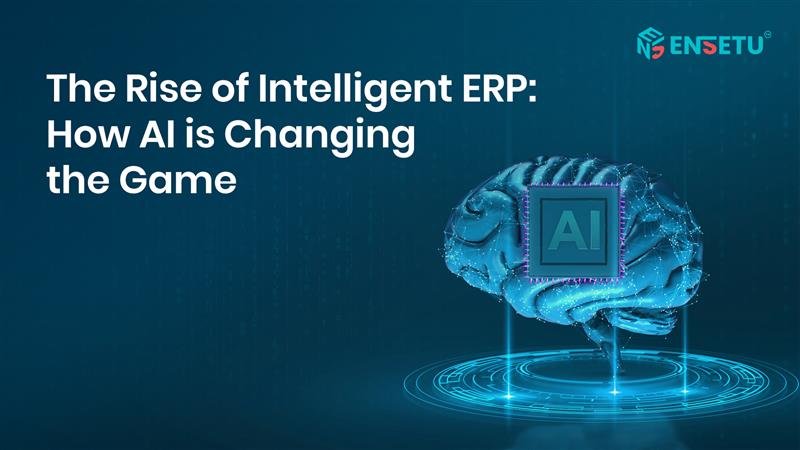
Enterprise Resource Planning systems have always been the silent engines behind business operations. They manage finance, supply chain, procurement, inventory, and every core workflow. For decades, they were reliable but heavily transactional. They recorded what happened. They processed what was entered.
Today, that world is changing. AI is transforming ERP from a passive system into a strategic intelligence layer that thinks, predicts, and guides decisions. In 2025, AI is not an optional enhancement. It is becoming the foundation of how modern enterprises plan, operate, and grow.
Why AI and ERP Matter More Than Ever
AI is no longer just an enhancement to ERP. It is reshaping the way organizations plan, optimize resource investment, and respond to business issues. As companies face increasing complexity in their digital ecosystems, they require systems that can think, not just record. AI-enabled ERP systems fill that void through implicit intelligence, speed, and proactive insights into daily business decisions.
1. From Automation to Intelligence
Traditional ERP systems streamlined operational work and reduced manual effort. Automation made processes faster and more consistent, which companies like Versa Cloud ERP often highlight. The limitation was that it was reactive—data was processed only after events occurred, and teams still had to interpret the meaning.
AI-enabled ERP changes this. These systems can predict, learn, recommend, and help businesses act ahead of time. It shifts ERP from being an operator to becoming an advisor.
2. Stronger Decision-Making with Predictive Insights
With embedded AI, ERP systems no longer wait for results—they forecast them. Organizations can anticipate demand, flag supply chain disruptions, and receive prescriptive recommendations on what actions to take. Companies move from visibility to real-time strategic intelligence.
3. Data Becomes a Strategic Asset
As emphasized by Deloitte and Harvard Business Review, AI insights are only as good as the data that backs them. Clean, integrated, and governed data makes it trustworthy and accurate. When organizations treat data as a strategic asset instead of an operational byproduct, it contributes to better decision-making and improved confidence in AI results.
What Organizations Are Getting
1. A Significant Increase in Efficiency
McKinsey estimates that AI-enabled workflow automation may increase operational efficiency by 30–45% across finance, procurement, inventory, and planning. Once AI is part of an ERP, the efficiency gain impacts the entire enterprise.
2. Strategic Investments Are Accelerating
Recent IDC findings show that a growing majority of enterprises are increasing AI spending to modernize their core systems and build AI-ready ERP environments. Yet many still express uncertainty about whether their existing ERP infrastructure can support advanced AI workloads—highlighting both demand and hesitation.
3. The Market Is Gaining Momentum
According to Gartner analysts, AI is becoming a standard built-in capability across major ERP platforms. Machine learning, predictive analytics, and natural language interfaces are shifting from optional modules to core features.
Where AI Is Making the Biggest Impact
AI is reshaping ERP systems by improving accuracy, speed, and decision-making across core business functions. The real value comes from embedding intelligence into everyday workflows—enhancing visibility, improving forecasts, reducing manual work, and guiding teams to take action before a problem arises. ERP is evolving from a system of record to a system of action.
1. Demand Forecasting
AI models use real-time signals to generate more accurate forecasts, lowering stockouts and reducing excess inventory.
2. Supplier Risk Management
AI can detect risky supplier behavior, such as late deliveries or financial instability. ERP systems can then recommend alternate sourcing options.
3. Financial Workflows
Invoice matching, reconciliation, and approvals are becoming automated with intelligent checks, reducing manual effort and minimizing errors.
4. Maintenance and Asset Management
AI identifies early signs of equipment failure, enabling predictive maintenance and reducing unplanned downtime.
5. User Interaction and Productivity
Natural language interfaces allow employees to ask complex operational questions and receive meaningful insights instead of raw data, making ERP more accessible.
What It Takes to Build an AI-Ready ERP
A single source of trustworthy and unified data: The accuracy of AI relies on the quality and trustworthiness of data. Integration and governance are essential.
Modern ERP architecture: Many legacy ERP systems cannot support real-time AI. Organizations need modular, extensible, API-led ERP platforms.
Workforce readiness, not just change management: Teams must trust AI insights and be capable of acting on them.
Clearly defined governance and risk controls: As AI starts making or recommending decisions, transparency and oversight become critical—especially in finance and compliance.
Incremental transformation: Instead of full ERP replacements, organizations benefit from piloting AI-enabled modules such as predictive demand planning, cash flow forecasting, and anomaly detection.
The Challenges That Hold Companies Back
ERP Readiness: Many organizations are unsure whether their ERP systems can integrate with AI. Legacy systems, heavy customizations, and outdated integrations slow progress.
Skills Gap: AI-enabled ERP success requires collaboration between data scientists, ERP experts, engineers, and domain specialists. Most organizations lack this skill mix.
Problems with Data Quality: AI needs clean, connected, consistent data. Many enterprises operate with siloed and inconsistent datasets, reducing AI accuracy and scalability.
ROI Evaluation: AI outcomes often appear over time. Leaders expecting immediate financial ROI may misjudge the value of operational efficiencies, causing delays in decision-making.
Conclusion
In 2025, the shift toward intelligent ERP is more than a technology upgrade—it is a strategic transformation in how organizations make decisions. ERP systems have evolved from processing engines to intelligent decision partners. Embedded artificial intelligence, predictive analytics, and natural language interfaces will make ERP the brain of the business.
There is a real opportunity, but also responsibility. Success will rely on clean data, cultural readiness, strong governance, and a clear vision for how operations evolve with AI capabilities. For companies prepared to build intelligently, 2025 can be the year their ERP transforms from a system that merely supports work to a system that elevates it.